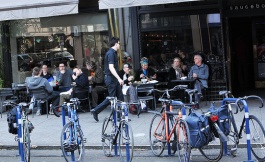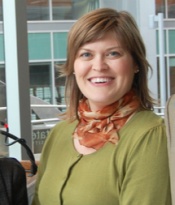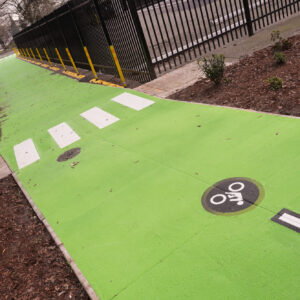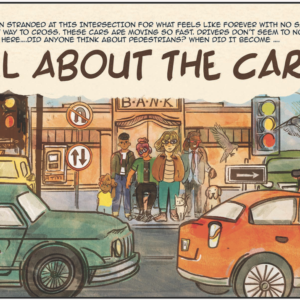
(Photo © J. Maus)
A research project at the Oregon Transportation Research and Education Consortium (OTREC, housed at Portland State University) is taking a closer look at how bike-riding customers and bike infrastructure (or lack thereof) impacts the business bottom line.
The principal investigator is Kelly Clifton, an associate professor at PSU. I sat down with Clifton last week to learn more.
“There are some businesses who think that cyclists are of lower incomes, that they spend less, that they’re not going to visit as much… ‘So why are we catering to them?’ they wonder.”
— Kelly Clifton, researcher
The impetus for this research came from the City of Portland and the Portland Development Commission (PDC). As PBOT pushes further out in the city, where bicycling is less common, Clifton says they want to be armed with information to quell fears that bikeway improvements are somehow bad for business.
“Where there bike network is less robust there’s some push back from businesses. They’re concerned about losing parking, and they’re concerned that the City is going to make it more difficult for cars to access their establishments… The study is to wed travel behavior with consumer behavior,” says Clifton.

(Photo: OTREC)
Armed with information gleaned from this research, the businesses might find that better bike access could even be good for business. But right now, many businesses think just the opposite.
“There are some businesses who think that cyclists are of lower incomes,” says Clifton, “that they spend less, that they’re not going to visit as much.. ‘So why are we catering to them?’ they wonder.”
Clifton’s project will look at the land use around several types of establishments to see how/if it correlates to the mode choice of customers. Her team will also survey customers about their travel patterns, spending habits, and vehicle choice. Managers of the businesses will also be interviewed to get their opinion of cycling customers and whether or not providing quality bike access is a priority.
Business types chosen for the customers surveys include coffee shops, “high turnover restaurants” like pizza and Mexican food, as well as Plaid Pantry convenience stores. Clifton had hoped to survey customers at Safeway and New Seasons, but both stores declined to take part (although New Seasons will supply researchers with their own in-house customer survey).
Going into the data-gathering phase of the study, Clifton says her “gut instinct” is that “cyclists spend just as much as anyone else.” “My null hypothesis is that there really won’t be any difference by mode at these types of establishments.”
The project has a budget of $250,000, which was paid for by the PDC, Bikes Belong, and Travel Oregon. Clifton hopes to have a final report completed by late fall of this year. Learn more about the study at OTREC.us.







Thanks for reading.
BikePortland has served this community with independent community journalism since 2005. We rely on subscriptions from readers like you to survive. Your financial support is vital in keeping this valuable resource alive and well.
Please subscribe today to strengthen and expand our work.
It’d be nice if Plaid Pantry put in bike racks at more of their stores, most of them I’ve visited I have had to lock up to the gate in front of the trashcans.
Shoot them an email about it. I did and got a response from the president of the company that they are revisiting the idea and will be contacting PBOT about trying a few out at their stores.
I will have to do that, although I no longer live in PDX. It’d be nice for when I visit.
Cool so I emailed them, I got a response from Laura, the administrative manager, who says she is also a cyclist. She asked me for a list of stores I frequent so she can add them to the list of stores that are getting racks. She wants me to try them out once installed, but since I am no longer in PDX hopefully some of you can do that for me and give me a report to send on to her.
Cool Jacob, I gave them store numbers 45 and 128 which were in my neighborhood.
I gave her 50th and Division, 112th and Division, and the one just east of 205 on Foster (111th I think).
Don’t forget the wheelbender racks that 7-11s love. Totally useless. The Freddies and Safeway in my neighborhood both sport those ‘wiggle’ racks, mounted so close to the building that they are totally useless also. Point being, having a rack is not indicative of anything. Having a USEABLE rack is golden.
I probably spend less per visit to most stores ($50 of groceries can be heavy), but this is heavily offset by my higher spending at bars.
Funny, I didn’t think about it all that hard until just now, but bike parking makes a huge difference in where I do my grocery shopping.
I live equal distance from a Fred Meyer and a QFC. QFC’s bike rack is vastly larger and located right next to the entrance; Freddie’s is small, off to the side, and requires navigating a huge parking lot to get to it. Guess which one gets my business?
fred meyer because qfc is wildly overpriced?
That’s funny, because QFC and Freddie’s are both Kroger stores.
Businesses with crappy bike parking don’t get my business, period; maybe this isn’t the best example, but I won’t ever shop at a Plaid Pantry, because none of them have any bike parking at all.
Yea but they space their shelves wide enough you can ride your bike into the store, grab a beer, and ride up to the counter.
That’s funny. Fred Meyer owns QFC.
Well, let’s do a thought experiment. Who has more money to spend: Someone who exercises and doesn’t waste money on gas, or someone who is sedentary and spends hundreds of extra dollars a year to fund their car lifestyle?
I buy $50 worth of groceries atleast twice a week by bike (augmented with a car trip on the weekends for big stuff). But when we bike on the weekend we ALWAYS stop at atleast one beer bar for a beverage and something to eat. When you expend energy to get somewhere you need to refuel!
I’d say when we’re biking it makes us FAR more likely to stop because it’s so much easier to find a parking spot for a bike than it is for a car. A lot of times when driving the spontaneous urge to stop and spend is squelched by the downer (and time suck) of finding a parking spot. There are none of those issues with bikes, which puts us in a far more jovial shopping mood. And on the occasion that we spot something that we want to buy that’s too big to take home on our bike, we usually purchase it anyway and arrange for a time when we can pick it up by car.
The other big thing to consider is that when we were a two car family we spent at least $1000 a month on car payments, gas and insurance. Now that we ride as our primary transportation we have FAR more disposable income to spend or save.
I am in the same boat as you. I generally find myself ‘store-hopping’ when riding my bike. Stop more places but spend less money at a single place. When I drive somewhere; yeah i spend more money, but only at a single store.
This report is so crucial, and couldn’t come at a better time. I’m grateful we have this sort of research leadership in Portland. Way to go, Kelly!
This report will be helpful if surveyors remember to poll the multitudes of so-called “invisible” cyclists — those who really ARE earning a lower income and who live mostly farther away from the hip urban centers where most bike infrastructure has already been developed.
Be sure to check in with communities of color in mid- and east county, many of whom ride because they cannot afford to drive or take transit. Bringing these riders into the mix will present a truer picture who who rides and who shops where.
The possibility that businesses cater more to people driving SUV’s, Acuras, BMW’s, etc. than people on bikes because of an assumed higher class and/or spending ability disgusts me. All the more reason to support those businesses who aren’t as prejudiced.
Seriously, most bikes cost more than my first car did.
The reason I bike is because it is cheaper, forget about paying for gas and maintenance on cars… and yeah the whole green thing is cool too. Parking is a lot more manageable, especially near city center and in the neighborhoods.
I wouldn’t mind seeing some kind of bike licensing system put in place to ensure that cyclists are trained on how to ride in traffic and signal and what their rights are and where they end. There are too many “do whatever I want because I’m on a bike” kind of riders out there that are messing it up for the rest of us. But I digress.
Bike-unfriendly Main Streets do not attract customers on bikes.
You can rate the quality of a place by the number of bikes out front. The more bikes the better.
I recently visited Boise and used this technique to find the best coffee house and best Pub for lunch.
Works well in most towns.
Anxiously awaiting results from this!
Considering that statistically most people who ride bikes also have cars, I think this is going to be a difficult study to implement using normalized data. What it seems to be getting at is what types of purchases a person is more likely to make while travelling via one mode or another – not whether the total consumer behavior of the person is dependent on their choice of transportation. The business participants in this study seem to be pretty self-selective : “Business types chosen for the customers surveys include coffee shops, “high turnover restaurants” like pizza and Mexican food, as well as Plaid Pantry convenience stores.” But these results should not be correlated with people’s spending power . How hard is it to answer the question : is having bike infrastructure good for business for a neighborhood coffee shop? I think I could answer this for less than $250k
Put another way – most people who own a bike go to a hardware/lumber store at some point, but relatively few bike there, and the nature of many purchases requires either a bike trailer or car. Do we need a study to tell us that parking lot access is positively correlated with spending at hardware stores?
“most people who own a bike go to a hardware/lumber store at some point, but relatively few bike there”
Certain types of stores,esp big box building supplies,furniture and electronics and appliance stores favor the car dependent outlying areas for the cheaper land prices for the car parking they require. Depending on density, food stores can get by with much smaller parking lots and find it easier/smarter to encourage transit/walking and biking.
Some questions for the business owners who perceive the bikes are bad for business:
How many customers can you have if you rely on street parking? Now how many potential customers can you have with pedestrians and cyclists?
If you run a café, is it better to have street side tables or on-street parking? How many customers can you fit in a parking space? Ever been to Europe? People there have cars too, but the central business areas are primarily pedestrian.
When I am on a bike I am far more likely to spend money on overpriced high profit items (Latte and premium deli food) and far less likely to buy cost competitive commodities (Costco). I think this mirrors some of the comments above. So, if your business is smaller and focused on high profits and lower volume, bike consumers can benefit your bottom line.
I have seen a study of cyclist income and while cyclists include the very poor and the very wealthy, the average income and education is above the mean. We also have more disposable income.
For you people only buying $50 worth of groceries at a time due to weight/space concerns, just get a used burly kid trailer. I could fit 6-7 bags in there (if packed carefully), even more if I didn’t use bags, like at the TJ’s on 82nd, they just let me wheel my trailer inside and we tossed everything in it, no bags needed.